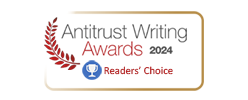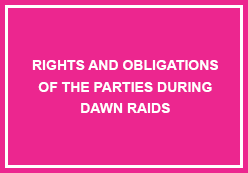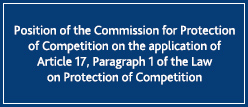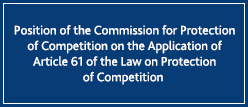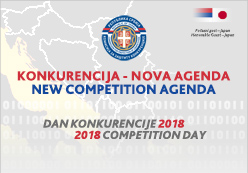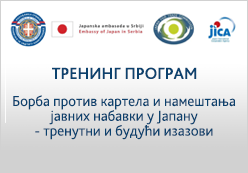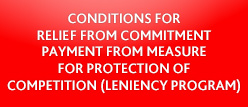Sorry, this entry is only available in Srpski.
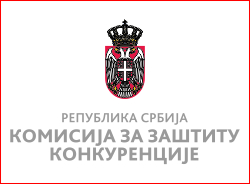 On October 10, 2024, the Commission for Protection of Competition initiated proceedings against DELHAIZE SERBIA DOO,PRIVREDNO DRUŠTVO ZA POSLOVNE USLUGE MERCATOR-S DOO BELGRADE, UNIVEREXPORT EXPORT-IMPORT DOO NOVI SAD, and PROIZVODNO I TRGOVINSKO PREDUZEĆE DIS DOO KRNJEVO, and conducted dawn raids at their premises. Dawn raids were also simultaneously conducted at the business premises of Cenoteka, as a third party. The proceedings were initiated based on the Commission’s reasonable assumption that the said retail chains committed competition infringement by entering into a restrictive agreement as defined in Article 10 of the Law on Protection of Competition.
On October 10, 2024, the Commission for Protection of Competition initiated proceedings against DELHAIZE SERBIA DOO,PRIVREDNO DRUŠTVO ZA POSLOVNE USLUGE MERCATOR-S DOO BELGRADE, UNIVEREXPORT EXPORT-IMPORT DOO NOVI SAD, and PROIZVODNO I TRGOVINSKO PREDUZEĆE DIS DOO KRNJEVO, and conducted dawn raids at their premises. Dawn raids were also simultaneously conducted at the business premises of Cenoteka, as a third party. The proceedings were initiated based on the Commission’s reasonable assumption that the said retail chains committed competition infringement by entering into a restrictive agreement as defined in Article 10 of the Law on Protection of Competition.
Namely, the Commission is carrying out a Sectoral Analysis of the state and competitive conditions in the markets for certain food products within the Republic of Serbia, covering the period from 2018 to 2022. In light of certain findings that underscored the need for further in-depth analysis, the Commission expanded its examination to assess the competitive conditions in the retail market for a wider range of food products.
A comprehensive analysis was carried out by tracking selected products from the retailers currently facing proceedings. Publicly available data from financial reports released by the Serbian Business Registers Agency indicate that these retailers collectively represent more than 50% of the retail market in the Republic of Serbia.
Thus, the Commission, over several months of monitoring price movements for 35 selected products, found that the prices for the observed products were identical across the retail chains.
Subsequently, in August 2024, the Commission compared prices for 45 products among the parties involved in the proceedings, including an additional retailer.
Based on all of the conducted analyses, the Commission was able to draw the following conclusions:
• the retail market in Serbia saw a value growth in the period from April 2023 to March 2024, while simultaneously experiencing a modest decrease in volume.
• in the period from April 2023 to March 2024, the increase in retail prices was nearly twice as high as inflationary pressures.
• in the period from 2016 to 2023, a substantial increase in revenue and gross margins was observed among the market participants under review, which is further substantiated by data regarding their operating profit.
• throughout the multi-month monitoring period from April to September 2024, the regular prices of eight products (milk, yogurt, oil, flour, sugar, eggs, coffee, and bananas) among all observed retailers were found to be either identical or similar, despite differing procurement conditions.
• the value of the consumer basket containing 45 selected products shows only slight variations among the parties involved in the proceedings, while being significantly lower at the retail establishment with the least favorable procurement conditions.
Based on the comprehensive findings, the Commission reasonably inferred that the indicators observed in the retail market resulted from a lack of competitive pressure among the examined retailers, indicating that these entities may have entered into a restrictive agreement as stipulated in Article 10 of the Law. This conclusion is particularly supported by the fact that the only form of competition for the observed products is price competition, which is entirely absent under conditions of identical regular and promotional prices.
The Commission takes this opportunity to emphasize that, in its work—especially in proving tacit, prohibited agreements—it has access to various mechanisms that require a certain degree of confidentiality. Consequently, the Commission is unable to publicly announce its potential intentions concerning actions in specific cases to preserve the integrity of the proceedings. For the same reason, the Commission refrains from commenting on media appearances or statements made by individuals or organizations, whether accurate or inaccurate, to avoid sending a “signal” to market participants that could jeopardize the proceedings before the Commission.
All individuals possessing data, documents, or other relevant information that may be pertinent to establishing the factual circumstances in the aforementioned proceedings are kindly invited to submit such information to the Commission for Protection of Competition, located at 25 Savska Street, Belgrade.
 Representatives of the Commission for Protection of Competition conducted a study visit to the Danish Competition and Consumer Authority (DCAA) and other institutions within the Danish public procurement system. The visit took place within the framework of the “Public Procurement Improvement Project,” which is funded by the United States Agency for International Development (USAID) and organized by NALED. Alongside the representatives of the Commission, representatives from the Public Procurement Office and the project were also involved.
Representatives of the Commission for Protection of Competition conducted a study visit to the Danish Competition and Consumer Authority (DCAA) and other institutions within the Danish public procurement system. The visit took place within the framework of the “Public Procurement Improvement Project,” which is funded by the United States Agency for International Development (USAID) and organized by NALED. Alongside the representatives of the Commission, representatives from the Public Procurement Office and the project were also involved.
One of the primary objectives of the visit was to gain a deeper understanding of the possibilities and technical features of new software, as well as the methodologies employed by the Danish Competition Authority for detecting suspicious bids in public procurement procedures. The Danish Competition and Consumer Authority has created software named “Bid Viewer,” designed to identify indicators of collusion in public procurement activities. Recognizing that the software can be an effective tool for identifying suspicions of collusion in public procurement, the continuation of bilateral cooperation with the Danish Competition Authority will be pursued in this context.
During the study visit, meetings were also held with institutions within the public procurement system: The meetings included the Public Procurement Enterprise SKI, the City of Copenhagen – Department of Public Procurement (Commune of Copenhagen), the Agency for Public Finance and Management within the Ministry of Finance – Department of State Procurement Program, the Advisory Unit for State Procurement, as well as the Embassy of the Republic of Serbia in Denmark.
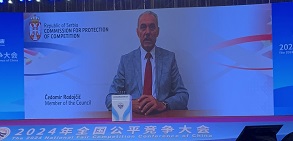 The State Administration for Market Regulation (SAMR) of the People’s Republic of China held a National Conference on Fair Competition in Wuhan, the capital of Hubei Province.
The State Administration for Market Regulation (SAMR) of the People’s Republic of China held a National Conference on Fair Competition in Wuhan, the capital of Hubei Province.
Council member of the Commission for Protection of Competition, Čedomir Radojčić, addressed the attendees via video message, emphasizing the importance of collaboration between the Commission and the State Administration for Market Regulation of the People’s Republic of China. The Commission for Protection of Competition and the State Administration for Market Regulation have signed a memorandum of cooperation and fostered a long-standing partnership that is vital for advancing competition protection internationally, harmonizing the legal framework, and improving economic cooperation between China and Serbia.
The conference was opened by Luo Wen, Minister of the State Administration for Market Regulation, who highlighted in his introductory speech that the primary goal of their institution is to accelerate the establishment of a unified national market, which will be driven by the comparative development of competition principles.
The conference in Wuhan featured participants that included officials from Chinese institutions, as well as experts from various competition authorities, such as representatives from Singapore, Hong Kong, Japan, Russia, Brazil, Italy, Spain, the United States, and others. Additionally, representatives from international organizations, including the OECD, the EU, and BRICS, were also present.
 The Commission for the Protection of Competition has prepared proposals for four new regulations concerning exemptions from the prohibition of agreements, and in particular:
The Commission for the Protection of Competition has prepared proposals for four new regulations concerning exemptions from the prohibition of agreements, and in particular:
- Proposal of the Regulation on categories of vertical agreements exempted from the prohibition of restrictive agreements;
- Proposal of the Regulation on categories of vertical agreements on repair and maintenance of motor vehicles and agreements on the sale of spare parts in the motor vehicle sector exempted from the prohibition of restrictive agreements; and
- Proposal of the Regulation on categories of technology transfer agreements exempted from the prohibition of restrictive agreements;
- Proposal of the Regulation on categories of agreements in the railway and road transport sector exempted from the prohibition of restrictive agreements.
In accordance with the provisions of the Law on the Planning System (“Official Gazette of the RS” 30/18), the Law on State Administration (“Official Gazette of the RS” 79/05, 101/07, 95/10, 99/14, 30/18, and 47/18), the Rules of Procedure of the Government (“Official Gazette of the RS,” nos. 61/06 – consolidated text, 69/08, 88/09, 33/10, 69/10, 20/11, 37/11, 30/13, 76/14, and 8/19 – other regulation), as well as relevant by-laws, consultations have been conducted in the process of preparing the proposals for the adoption of the aforementioned regulations.
The objective of conducting consultations was for the Commission to collect and assess pertinent information, viewpoints, remarks, and suggestions from various stakeholders, particularly legal entities and individuals whose positions, rights, obligations, and legal interests may be impacted by the proposed regulations.
The consultations were conducted through the eKonsultacije Portal and took place from July 4, 2024, to July 15, 2024. In the course of the consultation process, the Commission received proposals and comments concerning the draft regulation on categories of vertical agreements exempted from the prohibition of restrictive agreements, as well as the draft regulation pertaining to categories of vertical agreements for the repair and maintenance of motor vehicles, including agreements for the sale of spare parts in the motor vehicle sector that are exempt from the prohibition of restrictive agreements. As a result of amendments in the draft regulation on categories of vertical agreements exempted from the prohibition of restrictive agreements, adjustments were made concerning vertical agreements within the draft regulation on categories of technology transfer agreements exempted from the prohibition of restrictive agreements.
